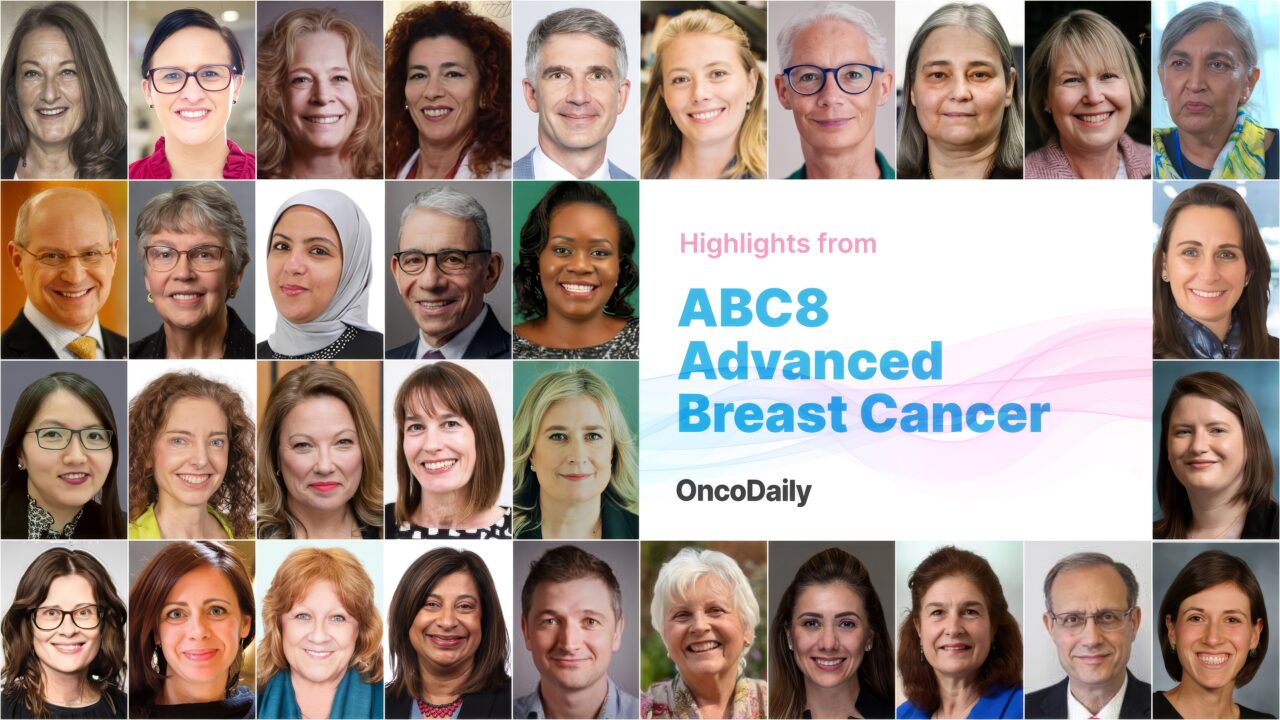The global oncology community will gather in Lisbon this November for the 8th edition of the Advanced Breast Cancer International Consensus Conference (ABC8), a landmark meeting dedicated to shaping the future of advanced/metastatic breast cancer care. Taking place from 6 to 8 November 2025 at the Centro de Congressos de Lisboa, this conference brings together clinicians, researchers, patient advocates and policymakers to translate cutting-edge evidence into worldwide practice.
For the oncology professional, particularly those involved in metastatic breast cancer, ABC8 promises to deliver real-world insights, consensus updates, and forward-looking strategies to close gaps in access, equity and outcomes. As we approach this milestone gathering, we’ll explore the key themes, emerging data, and practical implications that will shape practice over the next decade.
So here are the highlights from all sessions of Day 1, capturing the most impactful data, discussions, and takeaways from ABC8
The challenges and benefits of oral treatment
Chairs: Medha Deoras-Sutliff,US and Marzia Zambon, IT
Eva Schumacher-Wulf, DE “Pros and cons of oral anti-cancer therapies: the patient perspective”
Drawing from her personal journey with metastatic breast cancer, she emphasized that while oral therapies provide patients with flexibility, independence, and fewer hospital visits, they also bring significant challenges. Managing numerous pills with strict timing, dealing with side effects, and navigating food or drug interactions can become overwhelming over time. Eva highlighted how these burdens often affect treatment adherence and quality of life, especially when patients feel isolated or lack timely professional guidance.
She urged for stronger education, clearer communication between patients and healthcare teams, and practical instructions tailored to each treatment regimen. Eva also underscored the potential of digital tools to support adherence and symptom monitoring, provided they are connected directly to medical teams. Her central message was that oral therapies represent progress in patient autonomy, but true success depends on structured support, personalized education, and ongoing collaboration between patients and clinicians.
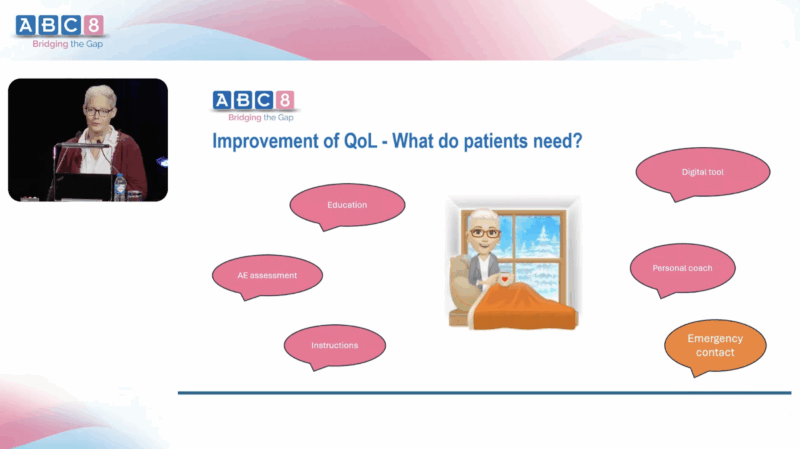
Volkmar Müller, DE “Pros and cons of oral anti- cancer therapies: the physician/ health system perspective”
Professor Müller noted that oral therapies have transformed oncology, allowing many patients to avoid frequent hospital visits and maintain normal daily activities. However, he stressed that this shift also brings new responsibilities for both patients and clinicians. Monitoring adherence, managing side effects, and ensuring equitable access remain ongoing challenges especially in systems where oral drugs are reimbursed differently from IV therapies.
He emphasized the importance of continuous feedback from patients, noting that side effects often go underreported between clinic visits. To address this, he advocated for the integration of digital tools and structured communication systems that enable real-time symptom tracking and interaction between patients and care teams.
From the health system perspective, Müller pointed out disparities in drug access, reimbursement, and infrastructure. While hospitals may see oral therapies as cost-saving, reduced reimbursement for outpatient care can create financial disincentives for institutions. He called for multidisciplinary collaboration and patient education to ensure safe, effective, and equitable implementation of oral therapies.
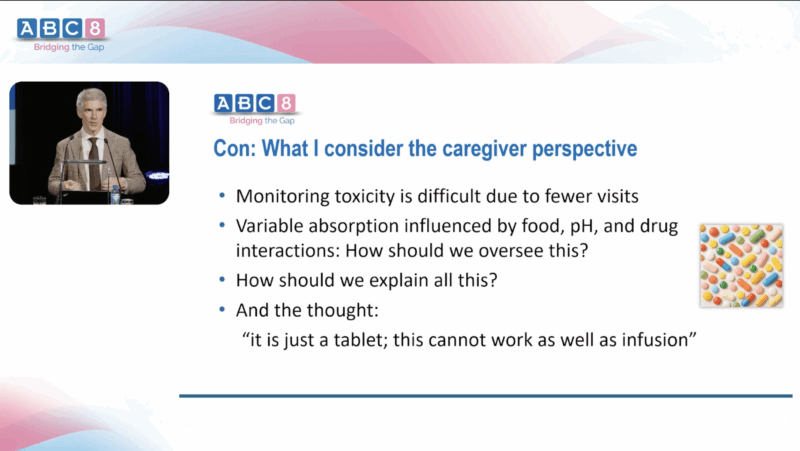
Janice Tsang, HKSAR,CN “Pharmacology: can we overcome the hurdles? (include interactions and issues with the excipient)”
Building on the insights of previous speakers, she explored the complexities of drug absorption, metabolism, variability, and drug–drug or drug food interactions, noting how these factors can significantly influence efficacy and toxicity in real-world practice. She explained that many oral agents such as aromatase inhibitors, CDK4/6 inhibitors, and PARP inhibitors face solubility and permeability limitations, leading to inconsistent bioavailability between patients. Dr. Tsang emphasized the importance of understanding CYP450 enzyme interactions, which can alter plasma drug levels, particularly when combined with common medications or supplements like St. John’s wort or grapefruit juice.
A unique and often overlooked aspect of her presentation was the discussion on excipients, the inactive components in oral formulations that play a vital role in drug stability, delivery, and tolerability. She pointed out that excipients can affect gastrointestinal comfort, cause allergic reactions, or alter drug absorption, especially in sensitive individuals. Emerging innovations, such as nanoparticle-based delivery systems, amorphous solid dispersions, and taste-masked formulations, were highlighted as potential strategies to improve solubility and patient adherence.
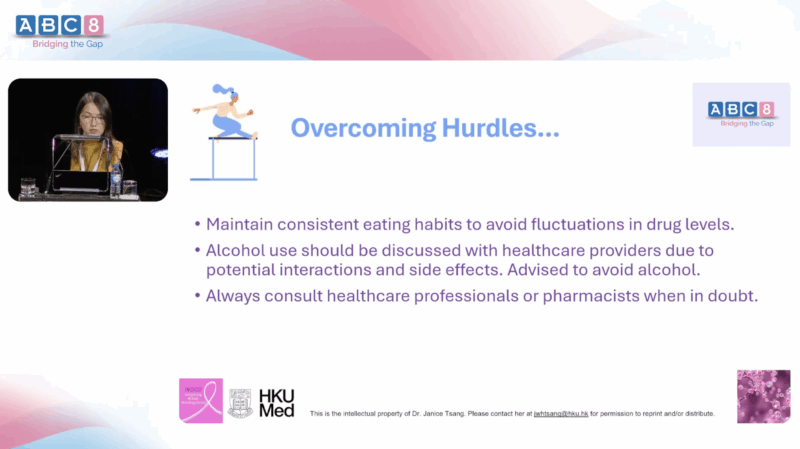
Amanda Drury, IE “Role of education, memory aids and continuous Support”
She began by highlighting a critical issue: up to 40% of patients are not consistent with their oral therapy, often due to emotional distress, treatment complexity, or uncertainty about when and how to take their medications. Dr. Drury stressed that education should not be a one-time information dump but an ongoing, personalized process tailored to each patient’s lifestyle, literacy, and emotional readiness. Nurses, she noted, play a key role in conducting comprehensive assessments to understand daily routines, dietary habits, and concurrent medications, ensuring that education aligns with real-world needs.
Dr. Drury outlined practical strategies for improving adherence, including “Teach-Back” techniques, where patients repeat information to confirm understanding and structured follow-up through calls or visits to reinforce learning. She underscored the value of memory aids, from simple pillboxes and printed calendars to digital reminders and smart pill bottles. Importantly, she cautioned that high-tech tools are not always the best solution; low-tech methods can be equally effective, particularly in rural or resource-limited areas.
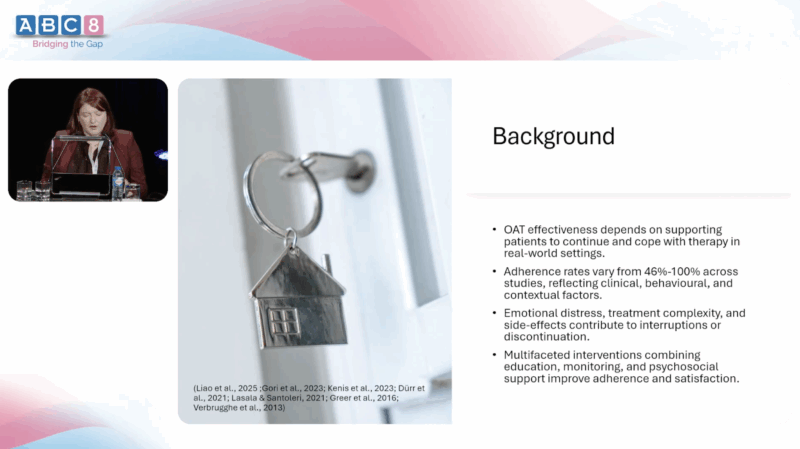
The crucial role of supportive and palliative services for patients living with ABC
Chairs: Isabelle Aloi- Timeus,MX and Ranjit Kaur, MY
Belinda Kiely, AU, “Summary of findings of the *Global Decade Report 2015-2025 Goal 7: access to supportive and palliative care)”
Dr. Kiely noted major global disparities in access, funding, and implementation, with palliative care often introduced too late and underused, only 15% of patients reported receiving it. While patient advocacy and peer support groups are growing, healthcare referrals to them remain limited.
She emphasized the importance of early, equitable integration of supportive and palliative care, and highlighted digital tools like Finding My Way as innovative solutions to improve access and reduce distress.
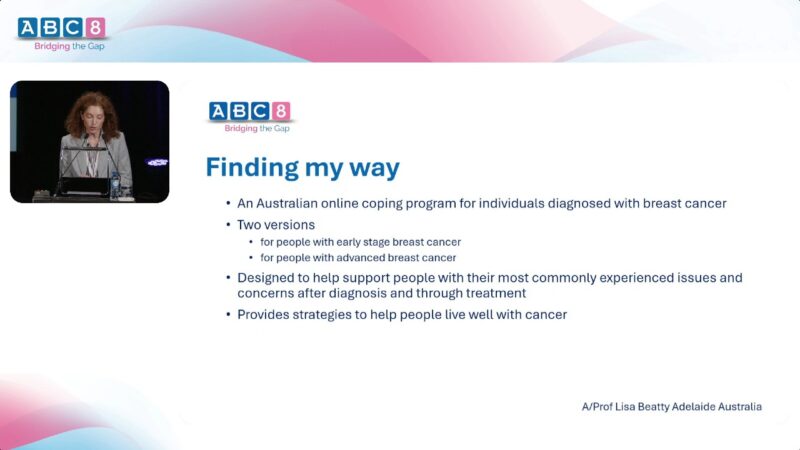
Luzia Travado, PT, “How to improve psychological support and mental health issues in patients living with ABC”
Her work highlights that negative emotions can affect brain metabolism, immune function, and stress hormone regulation, influencing disease progression and treatment outcomes. Surveys show widespread unmet psychosocial needs, with stigma and insufficient funding as key barriers.
Dr. Travado stressed that routine distress screening, integration of psychological services into cancer care, training for healthcare professionals, and virtual support programs are critical. She called for broader societal awareness and prioritization of mental health in oncology to truly improve patient quality of life and outcomes.
Rania Azmi, KW, “The importance and multidimensionality of social and financial support”
She emphasized that well-being is multidimensional, encompassing not only physical health, but also mental, social, financial, cultural, and spiritual aspects. Unlike wellness which is intentional health-focused action well-being integrates personal happiness and purpose, making it deeply individual.
Azmi stressed the “well-being triangle”: the soul (one’s inner self), the self (self-awareness), and the other (authentic connection and sense of purpose). Understanding oneself and prioritizing what matters most is key to self-worth and resilience.
She also underlined that financial and social support are vital yet often overlooked, and called for broader integration of these aspects into cancer care, alongside guideline recognition, advocacy, and personalized approaches to enhance patient quality of life and holistic support.
Ginny Mason, US , “Should advanced/metastatic cancer be considered a disability and have the same legal rights?”
Mason highlighted that work often defines identity, and side effects or treatment schedules can make maintaining employment difficult. Legal protections for patients vary globally, with many facing stigma, discrimination, and inconsistent policies. In the U.S., for example, short-term disability programs are often insufficient, and employment-linked health insurance adds further complexity, as losing work can mean losing vital coverage.
Patients also face societal misconceptions: appearing “well” can mask the serious effects of metastatic disease, making access to disability benefits more challenging. Mason stressed the need for robust legal safeguards, better public understanding, and advocacy to ensure patients with ABC can maintain financial security, healthcare access, and quality of life while living with a long-term, life-altering condition.
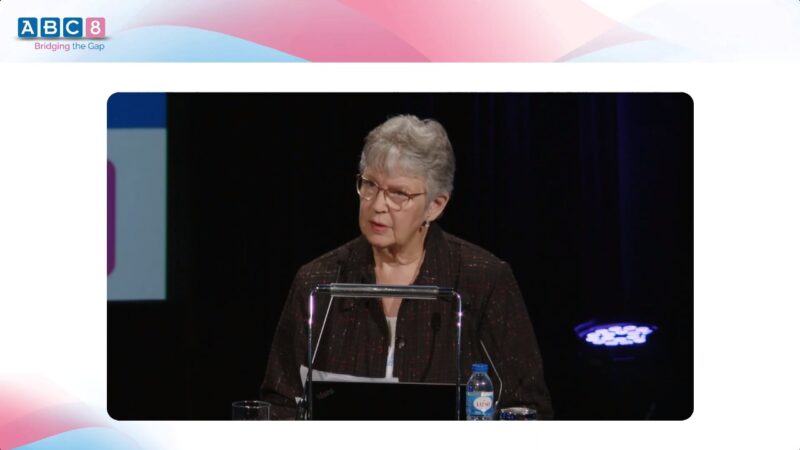
Opening session
Chairs: Fatima Cardoso, PT, Larry Norton, US and Eric P.Winer, US
Fatima Cardoso, PT “Welcome to Lisbon and to ABC8”
Fatima Cardoso welcomed attendees to ABC8 in Lisbon, acknowledging the milestone nature of this year’s congress as it marks ten years of work by the ABC Global Alliance. She highlighted the distribution of the ABC Global Charter and Global Report, which together summarize a decade of progress in advanced breast cancer research, care, and advocacy. The first ABC Decade Report, covering 2005 to 2015, laid the foundation for the ABC Global Charter, establishing ten goals for the decade to unite healthcare professionals, patients, advocates, policymakers, and industry in improving outcomes and quality of life for people living with advanced breast cancer. Over the past year, the Alliance assessed progress against these goals through surveys, desk research, social listening, registry data, policy analyses, and collaboration with the McCabe Center for Law and Cancer, resulting in the Global Decade Report 2.0 and the updated charter for the next decade.
Cardoso noted significant achievements over the past ten years. Median overall survival has increased from 26 to 33 months, with some subtypes, such as HER2-positive and luminal/HER2-negative, now exceeding 50 months when treatments are accessible. Data collection and the development of ABC-focused registries, along with quality indicators for metastatic disease, have improved understanding of real-world patient outcomes. Quality of life has also improved, supported by increased research on patient-reported outcomes and the development of metastatic breast cancer-specific tools, such as MR44. Efforts to expand access to both innovative and essential medicines, supported by partnerships like the Max Foundation and ATOM coalition, as well as increased radiotherapy capacity in some regions, reflect progress in ensuring patients can benefit from modern therapies.
Despite these advances, Cardoso emphasized that significant gaps and inequities remain. Survival gains for triple-negative breast cancer remain minimal, and data on the global population living with advanced breast cancer are still incomplete. Inequities in access to care have grown both between and within countries, with differences in treatment availability influenced by insurance coverage and rising out-of-pocket costs. Quality-of-life assessments are inconsistently applied, with fewer than half of healthcare professionals regularly incorporating them into clinical practice.
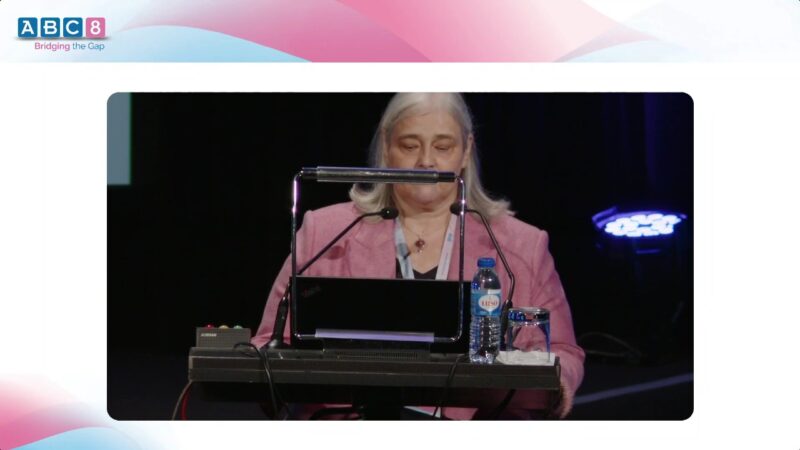
The new ABC Global Charter for 2025–2035 updates the original ten goals, maintaining continuity while reflecting current priorities, including continued improvement in survival, quality of life, equitable access, and patient-centered care. Cardoso underscored that achieving these goals will require sustained global collaboration across healthcare providers, patient advocates, and policymakers. She concluded by acknowledging the dedicated ABC Alliance team, whose collaborative effort over the past two years produced the report and charter, ensuring that ABC8 not only reflects past achievements but also sets a roadmap for the next decade of progress in advanced breast cancer care.
Lesley Stephen, UK “Tackling the challenges that ABC patients face”
She highlighted how poor communication, like being told to “make a will” at diagnosis can deeply affect patients, stressing the need for compassionate, patient-centered dialogue and better communication training for clinicians.
Stephen also called for accurate data collection, noting that many countries still don’t count metastatic patients, making their needs invisible. Sharing her own story, she credited a phase I clinical trial with saving her life and revealed that only 23% of UK patients have ever discussed trials with their doctors. To change this, her charity Make 2nds Count created a clinical trial matching service, helping over 2,000 patients find hope and options.
Through initiatives like the Patient Summit, she empowers patients with clear information and community support. Stephen closed with a powerful message: “We need more research, more access, and to be counted awareness is not enough, we need action.”
Larry Norton, US “ABC8 Award lecture: How do we get from progression-free-survival to cure?”
He described how metastatic tumors grow not just through cell division but by “self-seeding” cancer cells spreading and reattaching to their original site, accelerating growth like a snowflake forming at its surface.
From this, he developed the dose-dense chemotherapy concept, showing that giving drugs in shorter intervals improves cancer cell kill and patient outcomes without increasing toxicity, a principle later proven in large randomized trials. Norton also emphasized the importance of combination strategies, such as pairing cytotoxic drugs with targeted agents like trastuzumab, and looked ahead to immunotherapy and tumor microenvironment modulation as future ways to sustain control and move closer to cure.
Best Abstract Presentation
Chairs: Larry Norton, US and Ranjit Kaur, MY
Thibaut Sanglier (Switzerland) presented real-world evidence from U.S. electronic health records, showing that overall survival in advanced breast cancer has steadily improved from 2011 to 2025 across all subtypes, reflecting the impact of modern therapies and better disease management.
Jennifer Merschdorf (US), CEO of the Young Survival Coalition, shared insights from Project 528, a global survey of young women living with advanced breast cancer. Findings revealed significant psychosocial and financial burdens, unmet mental health needs, and gaps in age-appropriate support and employment protections underscoring the need for survivor-informed, policy-driven care models.
Laura Pinheiro (US) presented the RAISE initiative an employment screening and navigation program for adults with metastatic breast cancer. Early results showed the approach is feasible and well-received, helping patients access tailored resources and navigate work-related challenges during treatment.
Are we better at meeting the needs of patients living with ABC regarding information and communication?
Chaired by Renate Haidinger (DE), Julia Maues (US), and Phoebe Ongadi (KE), with speakers Lesley Fallowfield (UK), Anna Cabanes (US), and Shani Paluch-Shimon (IL).
Over the past decade, there has been a growing emphasis on patient-centered care and shared decision-making, yet studies show that real-world practice often lags behind patient expectations. Many patients still report that their emotional and psychosocial needs are not adequately addressed, treatment options are insufficiently discussed, and their personal goals and preferences are sometimes overlooked. While communication skills training for healthcare professionals has increased, its quality and impact remain inconsistent, often failing to translate into meaningful improvements in the clinical setting. Key gaps include relationship-building, discussing prognosis, navigating difficult conversations, and tailoring information to advanced disease-specific needs.
Data from the ABC Global Alliance surveys highlight that although patients increasingly rely on digital resources, healthcare professionals remain the primary source of clinical information. Patient advocacy groups are emerging as crucial partners in filling gaps, particularly around non-clinical information such as financial rights, employment, and social support. However, disparities persist based on geography, socioeconomic status, education level, language, and access to specialized centers.
Workshops conducted with international patient advocates emphasized the need for more effective, patient-centered communication, continuity of care across multidisciplinary teams, and guidance for informal caregivers. Despite advances in digital information and increased training availability, patients still report unmet needs and dissatisfaction with the way information and communication are handled in clinical practice.
Written by Nare Hovhannisyan, MD


